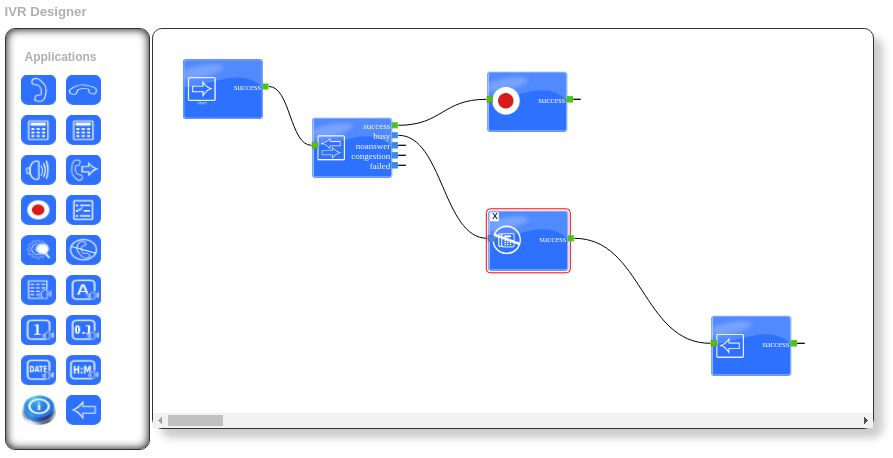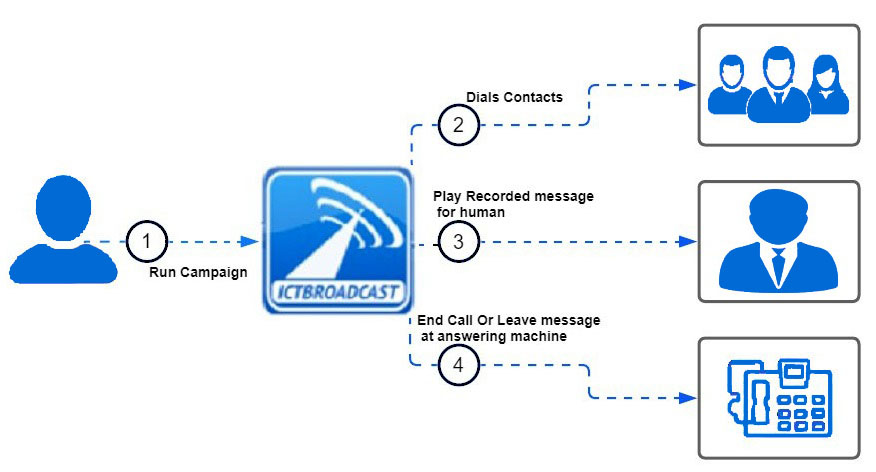Successful enterprises now depend more than ever on efficient communication in today’s fast-paced, digitally connected world. Businesses from various industries are continually seeking methods to expand their reach, interact with customers more effectively, and convey essential information in a way that minimizes unnecessary delays and errors. These demands are often not met by traditional manual dialing techniques due to their slowness, labor intensity, and susceptibility to human error. The process of contacting customers, clients, and prospects with the least amount of effort has been revolutionized by automated phone-calling software. It greatly increases efficiency and guarantees consistent, timely communication by allowing companies to plan, manage, and make thousands of calls at once.
This technology is extensively used for sending out appointment reminders, delivery updates, emergency alerts, polls, marketing initiatives, and customer support follow-ups. In addition to lower operational expenses, companies benefit from improved workforce productivity because workers can concentrate on activities that need innovation and human interaction. ICTBroadcast: Automated phone-calling software has evolved into a need for contemporary outreach tactics, regardless of whether it is a small company looking to expand its reach or a big corporation managing a high volume of communication. It is essential in today’s cutthroat industry since it closes the gap between companies and their target markets and provides precision, scalability, and dependability that human calling cannot.
What is ICTBroadcast: automated phone-calling software?
ICTBroadcast: Automated phone-calling software is a sophisticated communication technology that allows firms to communicate with a large number of people effectively without having to make manual calls. It sends information to thousands of people in minutes using prerecorded or dynamically produced voice messages. It gets rid of the inefficiencies and mistakes of manual calling by automating every aspect of the calling process, including contact list management, scheduling, and customized message delivery. Modern systems integrate effortlessly with customer databases, marketing platforms, and CRMs, guaranteeing precise targeting and accurate call performance reporting. This program is used by firms of all sizes for a variety of purposes, such as payment reminders, appointment reminders, emergency alerts, surveys, promotional campaigns, and follow-ups. In addition to saving a lot of time and money, automation enables employees to concentrate on more strategic and valuable client interactions. Automated phone calling software has become an essential tool for ensuring consistent, scalable, and dependable outreach as communication needs increase.
How Does ICTBroadcast: Automated Phone Calling Software Work?
By integrating cutting-edge telephony, data integration, and intelligent automation, automated phone calling software enables the management of big outbound calling campaigns with very little human involvement. The procedure starts with companies uploading or syncing their contact lists, which are frequently linked directly to CRM or marketing systems for current and accurate data. The system then schedules the delivery of pre-recorded or text-to-speech messages that users have created to the most opportune times. The program dials numerous numbers simultaneously once the campaign begins, utilizing predictive and progressive dialing methods to increase call efficiency by avoiding busy signals, voicemails, or unanswered calls. Many platforms also include interactive voice response (IVR) capabilities, which allow users to engage with calls by pressing keys or speaking voice input for more instructions. Real-time analytics track the status of each call—an
Key Features of ICTBroadcast: Automated Phone Calling Software
Mass Call Broadcasting
With automated phone calling software, businesses can make thousands or even millions of calls at once without overburdening their staff. It is especially helpful for sending out a lot of notifications, such as service updates, marketing initiatives, appointment reminders, and emergency warnings. It significantly reduces the time spent on outreach and ensures that vital information reaches recipients quickly and consistently by eliminating the bottlenecks associated with manual dialing. Bulk calling is a crucial component of any massive communication plan because it enables firms to quickly expand their campaigns.
Advanced Predictive Dialing
Intelligent dialing technology optimizes efficiency by managing calls in a way that reduces idle time. Predictive dialing algorithms foresee agent availability and dial numerous numbers simultaneously, bypassing busy signals, unanswered calls, and voicemails. Progressive dialing connects calls one at a time, ensuring that agents are always prepared to engage when a recipient answers. These features work together to boost call connection rates, maximize agent efficiency, and improve the overall success of outbound initiatives.
Interactive Voice Response (IVR)
IVR systems let users respond to calls via keypad choices or spoken commands, giving self-service alternatives without the need for live agents. Multi-level IVR menus may be set up by businesses to route calls, collect survey responses, confirm appointments, or answer customer questions. By allowing consumers to manage their interactions and lessen operational burden on support staff, this feature improves the user experience and makes outreach more effective and captivating.

Pre-recorded messages and text-to-speech (TTS)
With text-to-speech technology, written messages may be transformed into real-sounding audio, enabling businesses to build customized campaigns swiftly without having to manually record each message. Pre-recorded audio guarantees a consistent delivery of branded messages, preserving professionalism and clarity in all communications. Regardless of the size of the campaign, these features allow organizations to roll out campaigns more quickly, modify communications in real time, and deliver a customized experience for each recipient.
Real-Time Reports and Analytics
Full reporting tools provide real-time insight into campaign success, including call delivery rates, interaction indicators, and recipient reactions. Using comprehensive analytics, companies can determine what works, spot opportunities for enhancement, and use data-driven decision-making to improve their outreach in the future. Real-time monitoring also aids in regulatory compliance by giving teams the ability to keep precise logs of each call for the purposes of auditing and ensuring quality.
Time Zone Administration and Scheduling
Businesses can schedule campaigns in advance using sophisticated scheduling tools, which automatically account for the time zones of the recipients. This guarantees that calls are answered during the best times, which increases customer satisfaction and response rates. With flexible scheduling tools, you can easily honor recipients’ availability while maximizing engagement by setting up recurring campaigns, making last-minute adjustments, and having precise control over the timing of your outreach.
Individualized Calling
By integrating recipient-specific data like names, order statuses, or appointment details into automated calls, personalization tools enable companies to personalize their outreach. Personalized communication fosters trust, boosts response rates, and strengthens customer relationships by giving the impression that the interaction is more relevant and human. Businesses may create meaningful connections with thousands of recipients without compromising efficiency thanks to dynamic personalization at scale.
Management of do-not-call (DNC) compliance
By immediately filtering out numbers on do-not-call lists and following regional communication rules, integrated compliance tools protect businesses from regulatory hazards. By fostering ethical outreach methods and strengthening customer confidence in privacy and respect for their preferences, these technologies shield businesses against fines. In order for automated calling to remain both effective and legally valid, compliance management is necessary.

Reliability and Scalability
The purpose of automated calling platforms is to manage increasing communication needs while maintaining high standards and efficiency. The program provides reliable, safe, and quick operation regardless of whether a business has to make hundreds or millions of phone calls. The program is a long-term solution for companies of all sizes since its dependable infrastructure ensures continuous service even during peak campaigns, and its scalability enables firms to easily increase their reach.
Overcoming Challenges in ICTBroadcast: Automated Phone Calling Software
Making sure that all laws are followed: To prevent legal problems, use integrated compliance tools to automatically filter Do-Not-Call numbers and keep abreast of changes in telecommunications regulations.
Enhancing Call Quality: Regularly check the system’s performance to make sure calls are clear and professional, invest in dependable networks, and utilize top-notch audio recordings.
Lowering Recipient Resistance: To foster trust and lessen the impression that something is spam, personalize your messages, arrange calls for the appropriate time, and clearly define your brand.
Streamlining System Integration: Work with skilled IT specialists to integrate systems seamlessly, and select software that offers strong APIs and integration support.
Enhancing Data Security: To safeguard sensitive client data from unauthorized access or breaches, use encryption, access controls, and safe storage procedures.